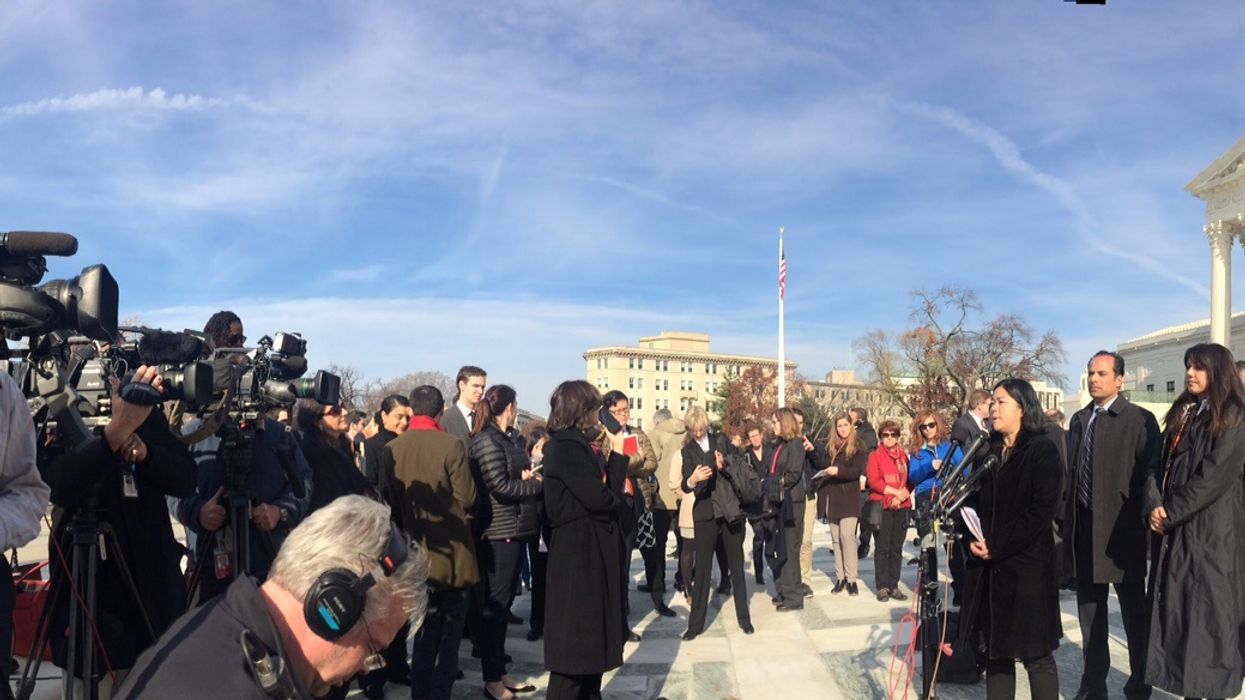For nearly 15 years at Common Cause, one of the country's oldest and most venerated democracy reform organizations, Kathay Feng has been focused intently on efforts to end partisan gerrymandering. After taking over the group's operation in California in 2005, she was at the heart of the lobbying and organizing effort behind creation of an independent redistricting commission in the most populous state. Since 2015 she has led all Common Cause's legal, legislative and ballot initiative redistricting efforts. The Cornell and UCLA Law School graduate has also fought for civil rights and against racial discrimination in Los Angeles. Her answers have been edited for clarity and length.
What's the tweet-length description of your organization?
Holding power accountable for 50 years.
Describe your very first civic engagement.
I ran for student president in high school. Luckily, no one else really wanted the job, so I won. But seriously, in college, when an Asian-American student was targeted and assaulted, I organized students to push the university to include a standard for handling hate crimes in the campus code of conduct.
What was your biggest professional triumph?
Helping lead the campaign that created the nation's first citizens redistricting commission. After three years of work, we knew legislators would never agree to give up power to draw district lines ensuring their own re-election. I never imagined how brutal the resulting initiative battle would be, going against Democrats and most of our progressive friends to take this power away from a Democratically controlled Legislature. I never imagined we would be working with Gov. Arnold Schwarzenegger or the Chamber of Commerce to pass Proposition 11 in 2008.
And then I did the hardest thing in my life, working with opponents of the proposition to raise money for outreach and public engagement. That ensured 30,000 people applied to be on the commission, which held over 100 meetings and hearings with huge crowds coming to speak about their communities.
The resulting maps have proven to be the most responsive to voter choices over this last decade, with a real shake-up of incumbents. The process has helped inspire people in Ohio, Michigan, Colorado, Missouri and Utah to insist on building a better redistricting mouse trap. And now Virginia and Oregon are approaching doing the same.
And your most disappointing setback?
I was pretty devastated when the Supreme Court handed us a disappointing decision in Common Cause v. Rucho, where we challenged North Carolina's partisan gerrymandering and the court said there was no room in the First or 14th Amendments to bring a federal case.
But then there was a strange twist of fate. Because of our parallel challenge to those lines under the North Carolina Constitution, Stephanie Hofeller, daughter of Republican redistricting operative Thomas Hofeller, turned over documents revealing her father's research on how to subvert the census by asking a citizenship question to gain partisan and racial advantage.
Those documents became part of the legal challenge to putting such a question on the census form. So on the same day we lost at the Supreme Court on partisan gerrymandering, we cheered the court's decision against instituting segregation through the census.
How does your identity influence the way you go about your work?
When I grew up in Texas, I wished I was white. Being Asian-American meant no one knew how to say my name, I was embarrassed to bring the food my mom made for me to lunch, and the teasing and loneliness were relentless. It took me a very long time to find myself.
When I worked for the Asian Pacific American Legal Center, I monitored voting locations where seniors who looked like my grandmother were sent to the back of the line because poll workers could not read their names. I worked with the Ileto family, which lost a member to a hate shooting. I endeavored to rebuild redistricting so no community would be cut up or cut out of political representation. At Common Cause, I have a huge platform to take on the same fundamental challenges — building a society of inclusion, where every voice is heard and respected.
What's the best advice you've ever been given?
Always ask: Who is not at the table who should be?
Create a new flavor for Ben & Jerry's.
Mango Manila Ice. Because, well, mango.
What's your favorite political movie or TV show?
Lately, we are watching "The West Wing" every night with our 13 year old, who's experiencing — for the first time — the comforting blanket of an imaginary White House that cares about doing the right thing, taking science and reason seriously, and struggling in every episode to put the public interest over personal interests.
What's the last thing you do on your phone at night?
Pokemon Go. It's the only thing that allows me to turn off the news and events of the day.
What is your deepest, darkest secret?
I think I just revealed it! But, also, I have started eating cereal in my coffee. It is simultaneously more efficient and surprisingly tastier than the sum of the parts, which is what I strive for as a general operating principle for life.




















Trump & Hegseth gave Mark Kelly a huge 2028 gift